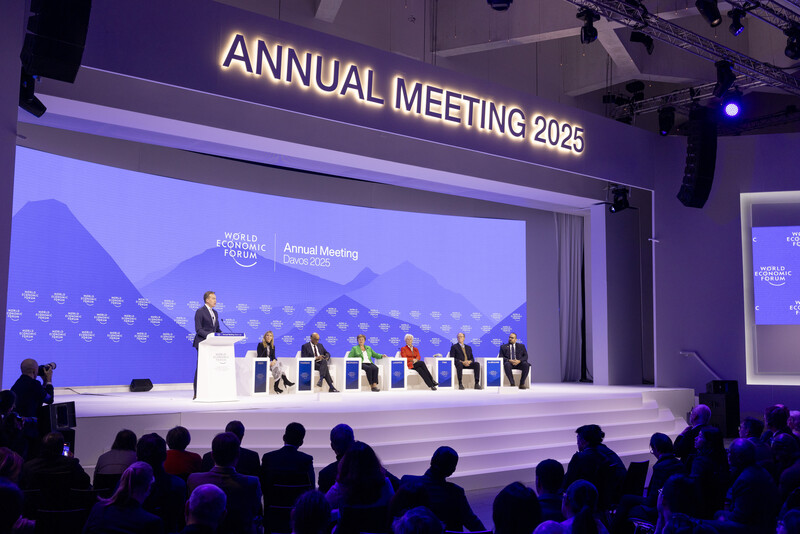DUBAI: Sustainability is no longer just an ethical choice but an economic necessity, according to Vivian Brady Phillips, Head of Strategic Initiatives, Urban Transformation at the World Economic Forum (WEF). “Green investments lead to tangible returns through cost savings and revenue growth,” she told Trends in an exclusive interview.
Phillips highlighted WEF’s Nature Positive Cities initiative and the Davos Baukultur Alliance, which foster sustainable urban development through public-private partnerships. She emphasized that businesses adopting eco-friendly practices not only reduce operational costs but also enhance brand reputation and attract eco-conscious consumers.
Despite challenges such as high initial costs and regulatory hurdles, Phillips underlined the importance of cross-sector collaboration in accelerating climate resilience and achieving net-zero targets.
Excerpts:
How is the World Economic Forum collaborating with governments, civic organizations, and private sector stakeholders to drive investments that balance economic growth with environmental and social responsibility?
The World Economic Forum collaborates with governments, leading companies, and civil society stakeholders through initiatives that prioritize inclusive urban development and sustainable practices. For example, our Nature Positive Cities initiative aids localities in valuing and protecting nature, addressing both sustainability and the economic risks of biodiversity loss. The Davos Baukultur Alliance similarly unites a coalition of governments and businesses across sectors like real estate, construction, finance, and technology to champion holistic and sustainable urban planning. Recognizing that tourism has rebounded to pre-pandemic levels, with countries like Saudi Arabia experiencing rapid growth, the Forum is also uniting leaders across the travel and tourism industry to address the sector’s main challenges and opportunities, (for example, talent, personalization) increase resiliency and promote sustainable practices that benefits cities, residents, and visitors alike.

What motivates green transitions?
Green transitions are driven by the urgent need to address climate change, reduce carbon emissions, and advance sustainable urban growth. The economic potential of green jobs, innovation in sustainable technologies, and long-term environmental benefits also motivate these transitions.
How are sustainable practices affecting the bottom line not only for tourism and real estate businesses but the urban landscape overall?
Sustainable practices reduce operational costs, enhance brand reputation, and attract eco-conscious consumers, benefiting not only tourism and real estate sectors but also contributing to equitable urban development. For city residents, these practices improve quality of life, raise property values, and create resilient communities.
Are there tangible returns from green investments, such as cost savings or revenue growth from eco-conscious urban dwellers, travelers, etc?
Yes, green investments lead to tangible returns through cost savings from reduced energy consumption and waste management. They also drive revenue growth by attracting eco-conscious consumers and travelers, and properties with sustainable features often command higher rental and sale prices.
What is the WEF’s commitment to its community of decision-makers and game changers in meeting the sector’s net-zero targets? Are there any key initiatives or partnerships you believe will drive impactful results toward climate resilience?
The Forum is committed to helping decision-makers meet net-zero targets by fostering public-private collaborations that explore innovative pathways to climate resilience. For instance, through the Centre for Urban Transformation, the Forum partners with cities worldwide to accelerate Sustainable Development Goals (SDGs) and climate goals in urban infrastructure, supporting cities like San Francisco and Toronto in advancing climate targets within the built environment. Additionally, the Forum engages industries to tackle challenges in travel, tourism, and last-mile urban deliveries.
What are the biggest challenges businesses face when implementing green practices, and how are industry leaders working to overcome these barriers? How important is a collaborative effort engaging private-public partnerships, and how is the World Economic Forum facilitating this dialogue and ally-ships?
Businesses often face high initial costs, regulatory complexities, and the need for technological adaptation when implementing green practices. Industry leaders are addressing these challenges by investing in R&D, advocating for supportive policies, and building strategic partnerships. The Forum facilitates cross-sector and cross-industry dialogue and collaboration, creating a unique platform for stakeholders to work together on overcoming barriers to sustainable practices. Moreover, some sectors such as travel and tourism face challenges on owning the narrative, the Forum also supports on magnifying the efforts being done and their positive impact in nature and society.
What role is technology playing in supporting sustainable tourism practices, such as energy-efficient operations, eco-friendly environments, or digital waste tracking, as well as community engagement?
Technology plays a vital role in the traveller journey allowing them to make more informed decisions (booking a flight and hotel, ordering a cab, exploring site-seeing alternatives) and support sustainable tourism by enabling energy-efficient operations, creating eco-friendly environments, tracking and managing tourist flows and reducing communication barriers between residents and visitors fostering community engagement. Innovations like smart city technologies improve connectivity and provide real-time information, while digital tools for waste tracking and management reduce environmental impact, supporting eco-friendly travel planning and activities.
(Edited by Riyaz Wani)








